Charles E W Bean, Diaries, AWM38 3DRL 606/63/1 - October - November 1916 - Part 5
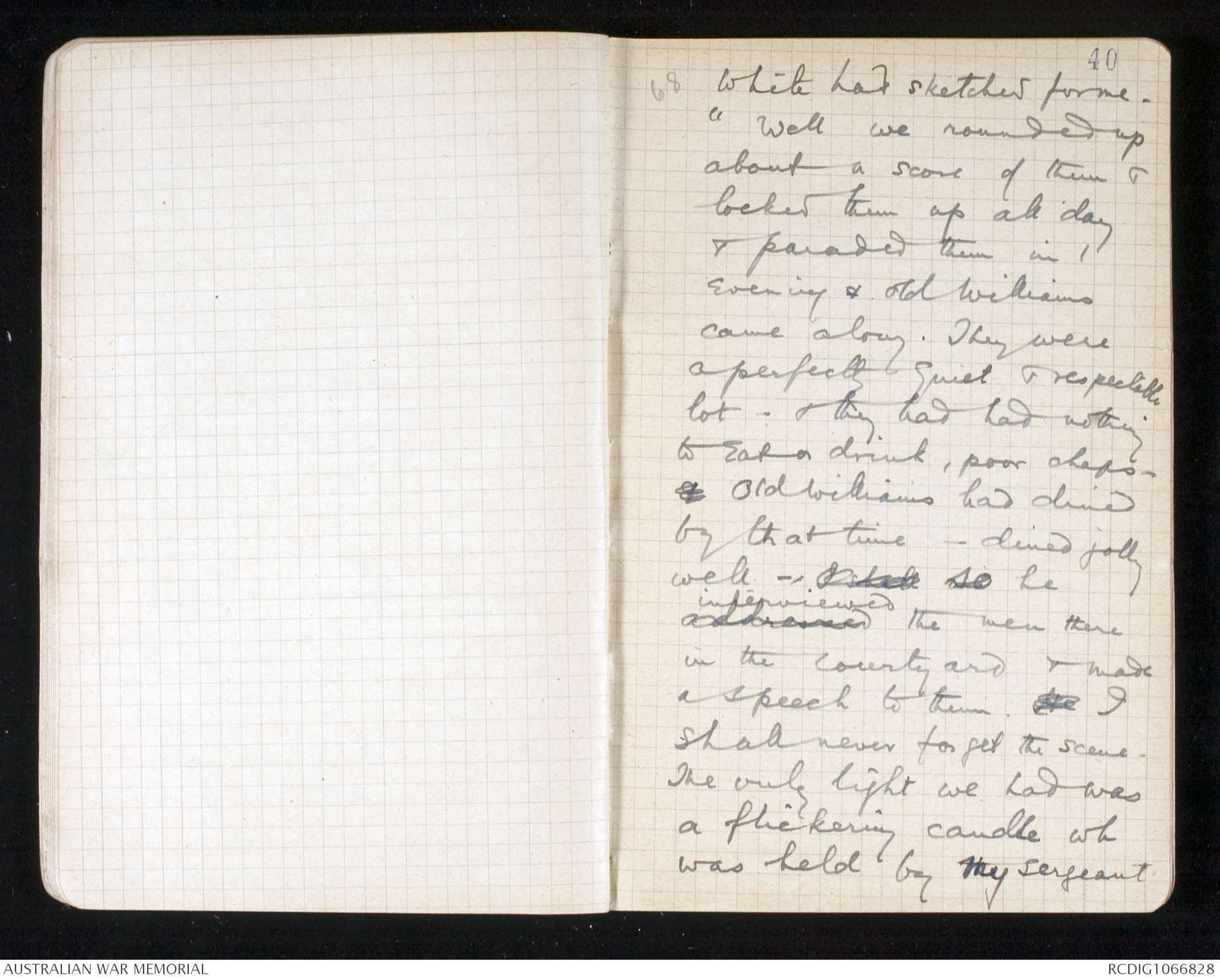
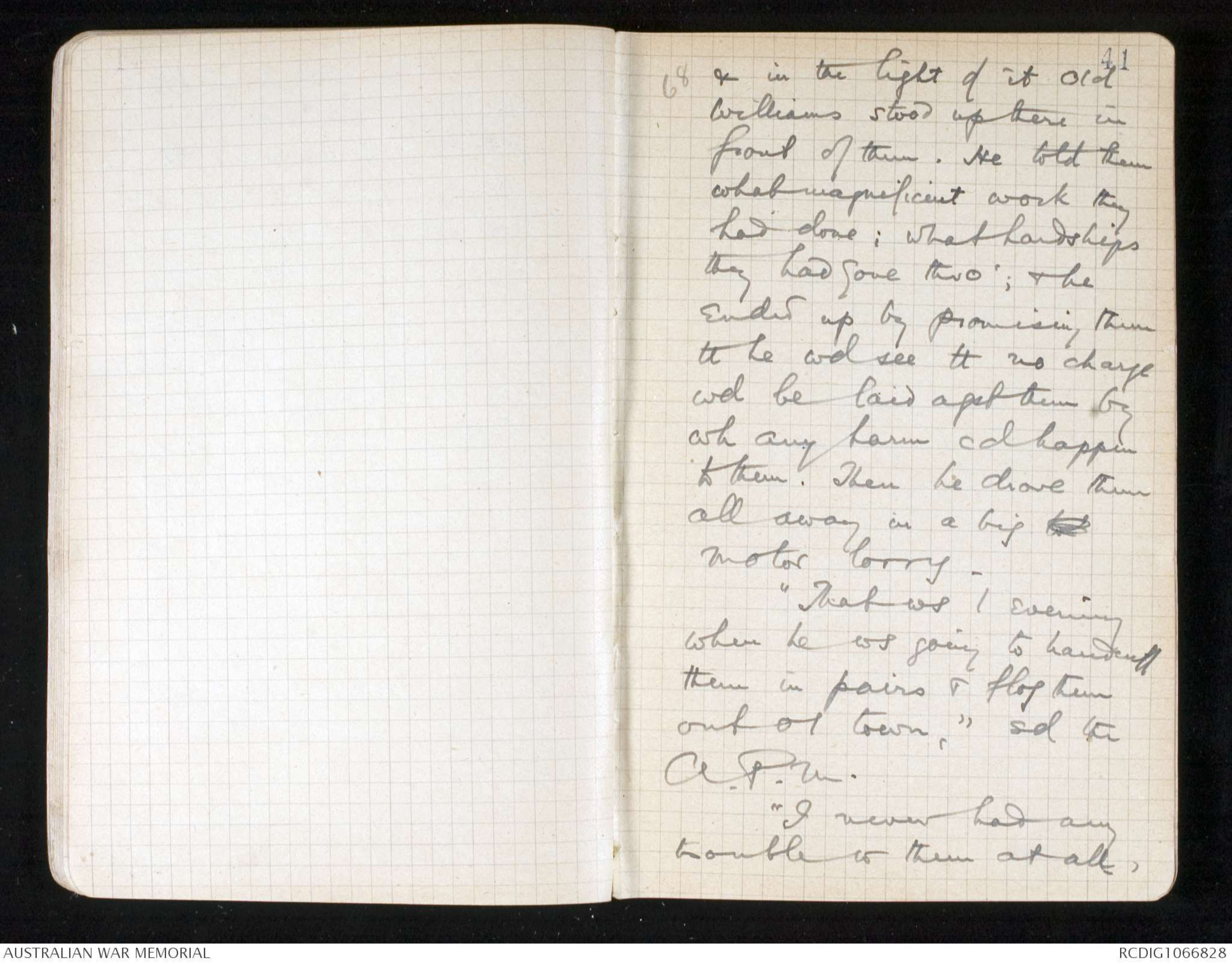
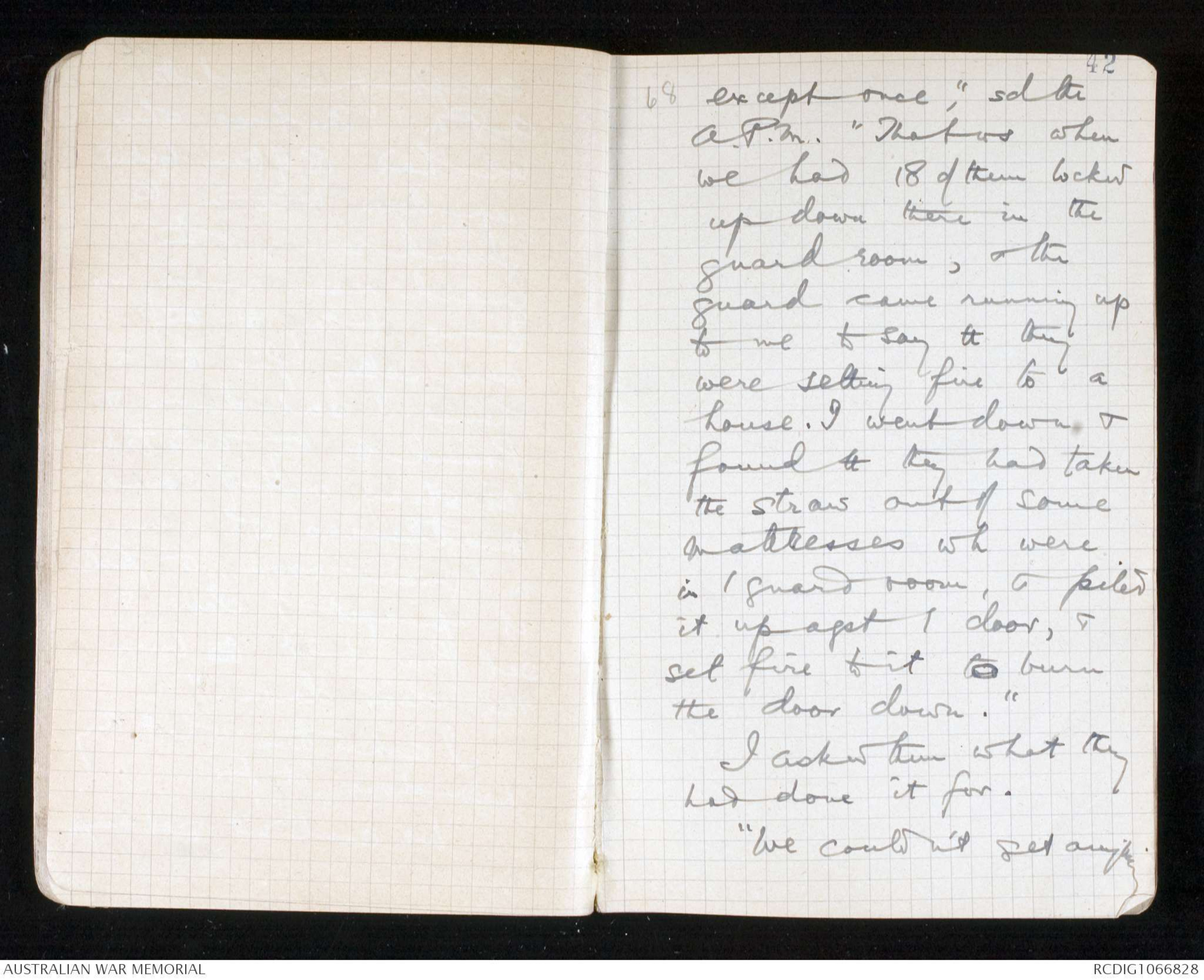
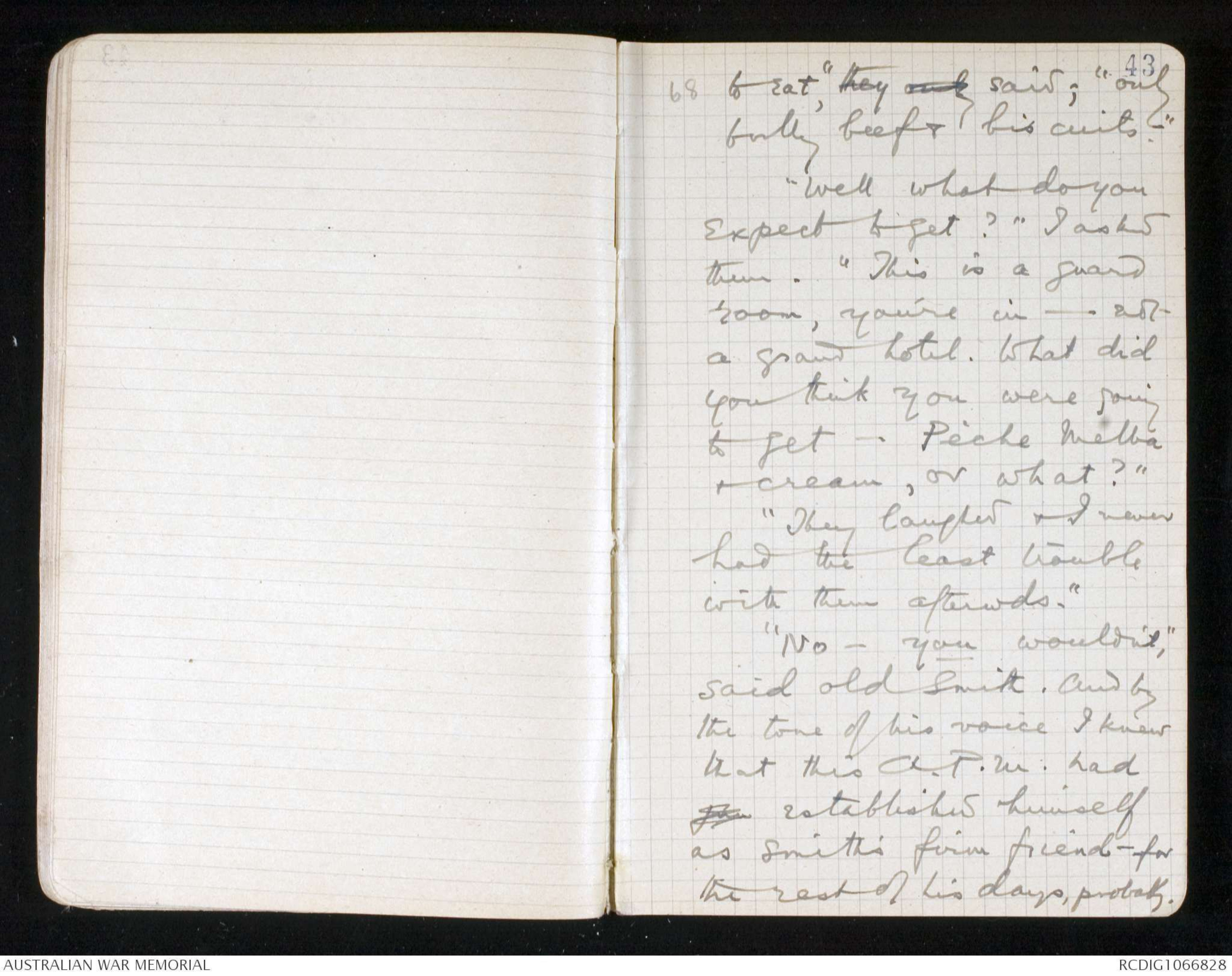
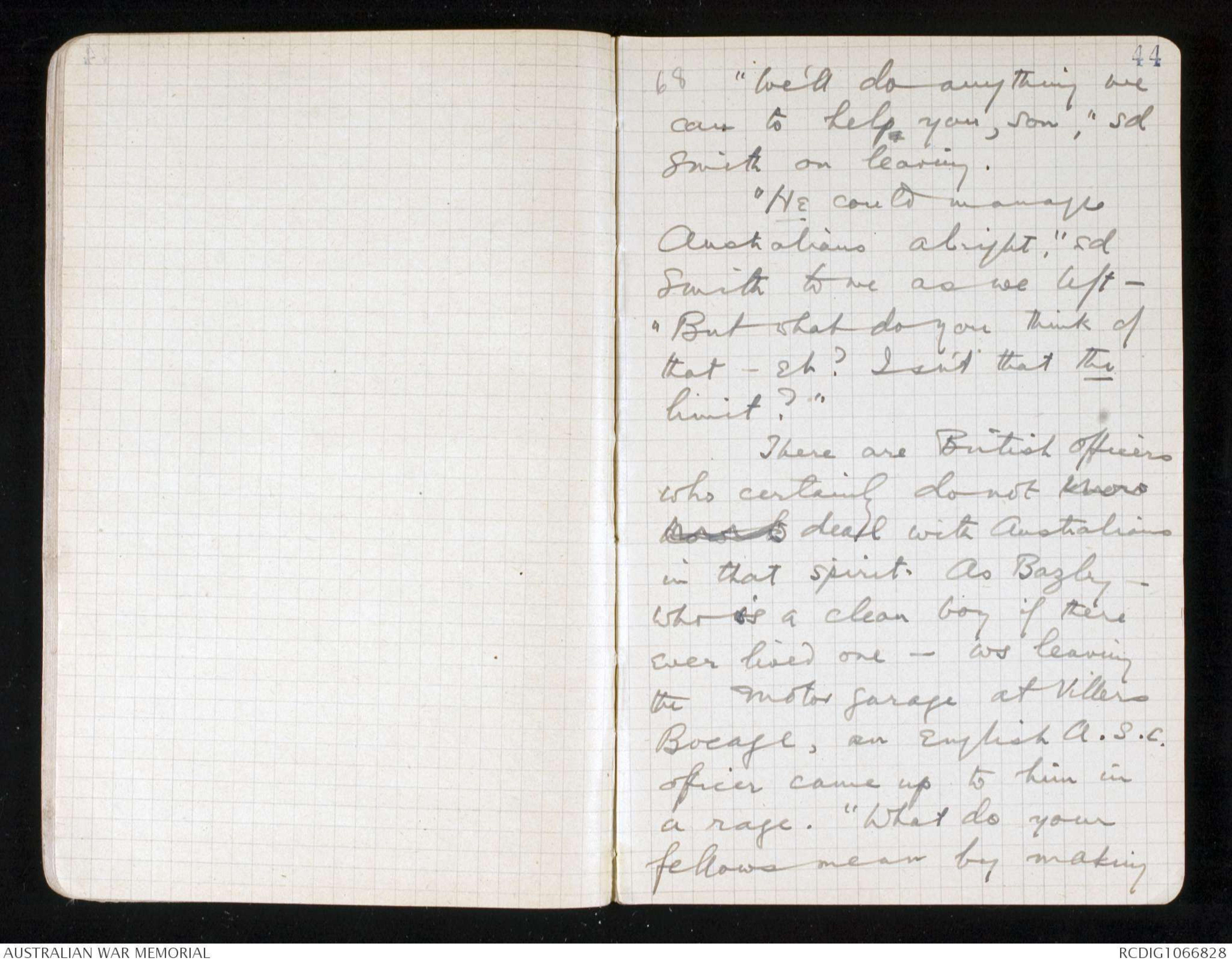
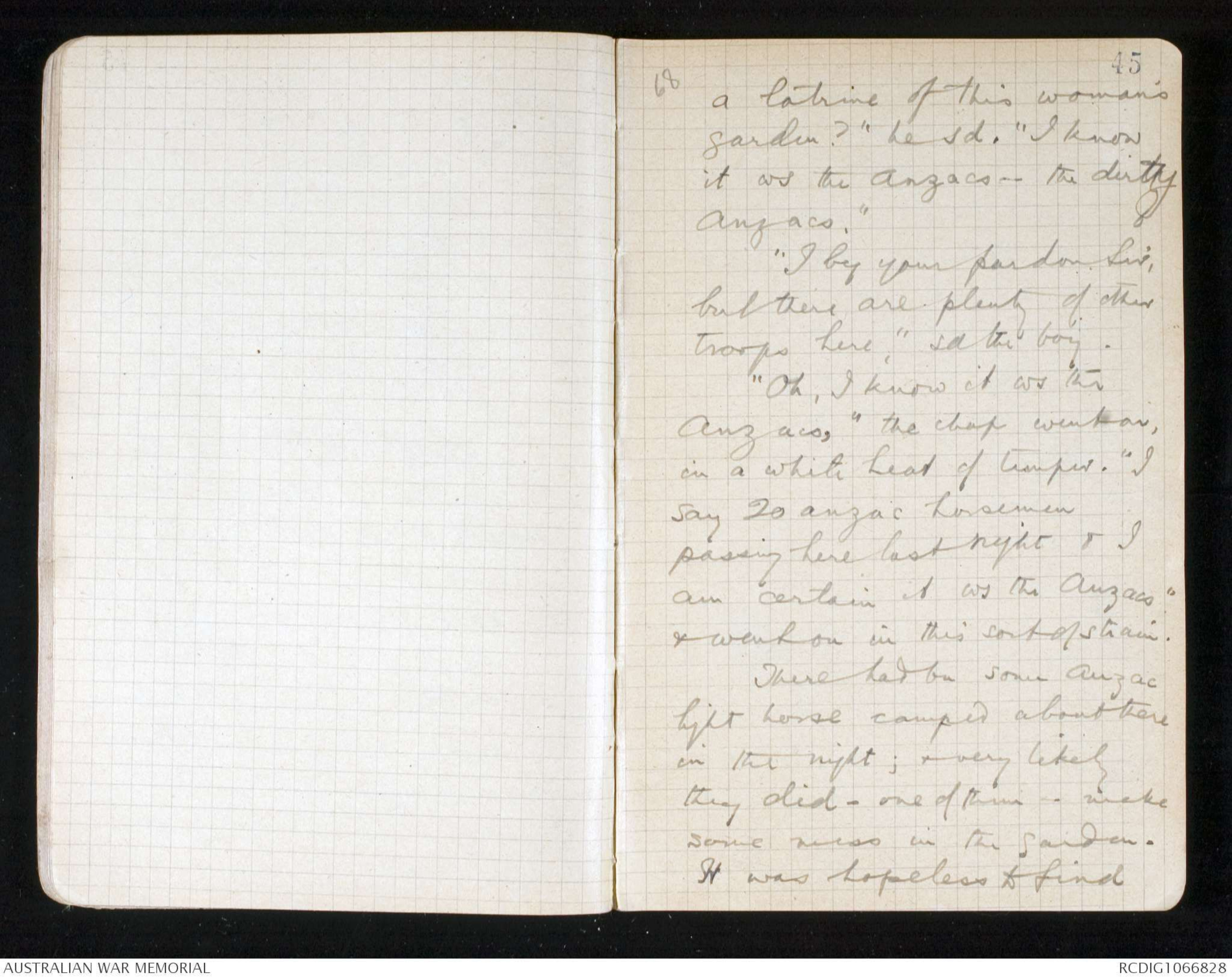
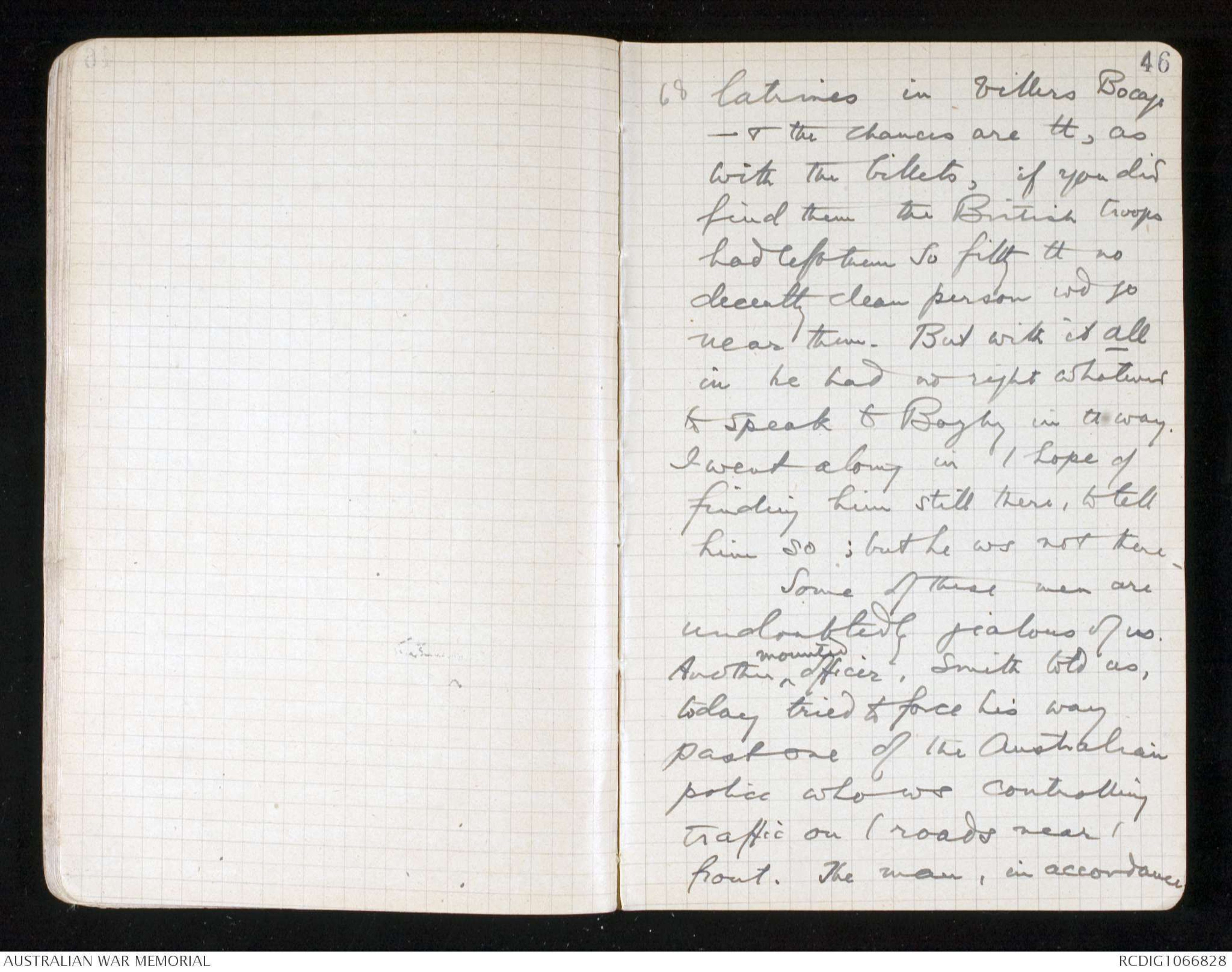
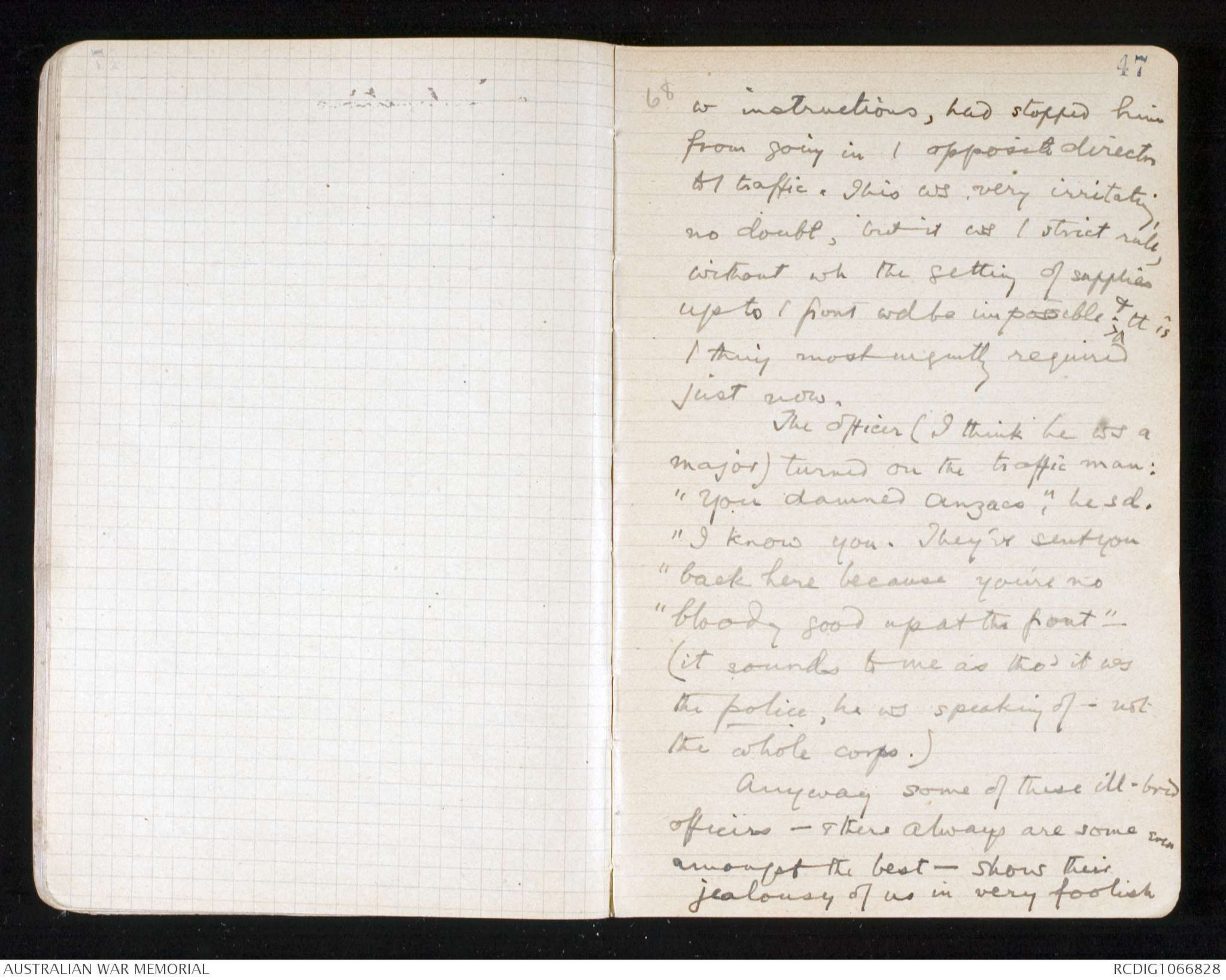
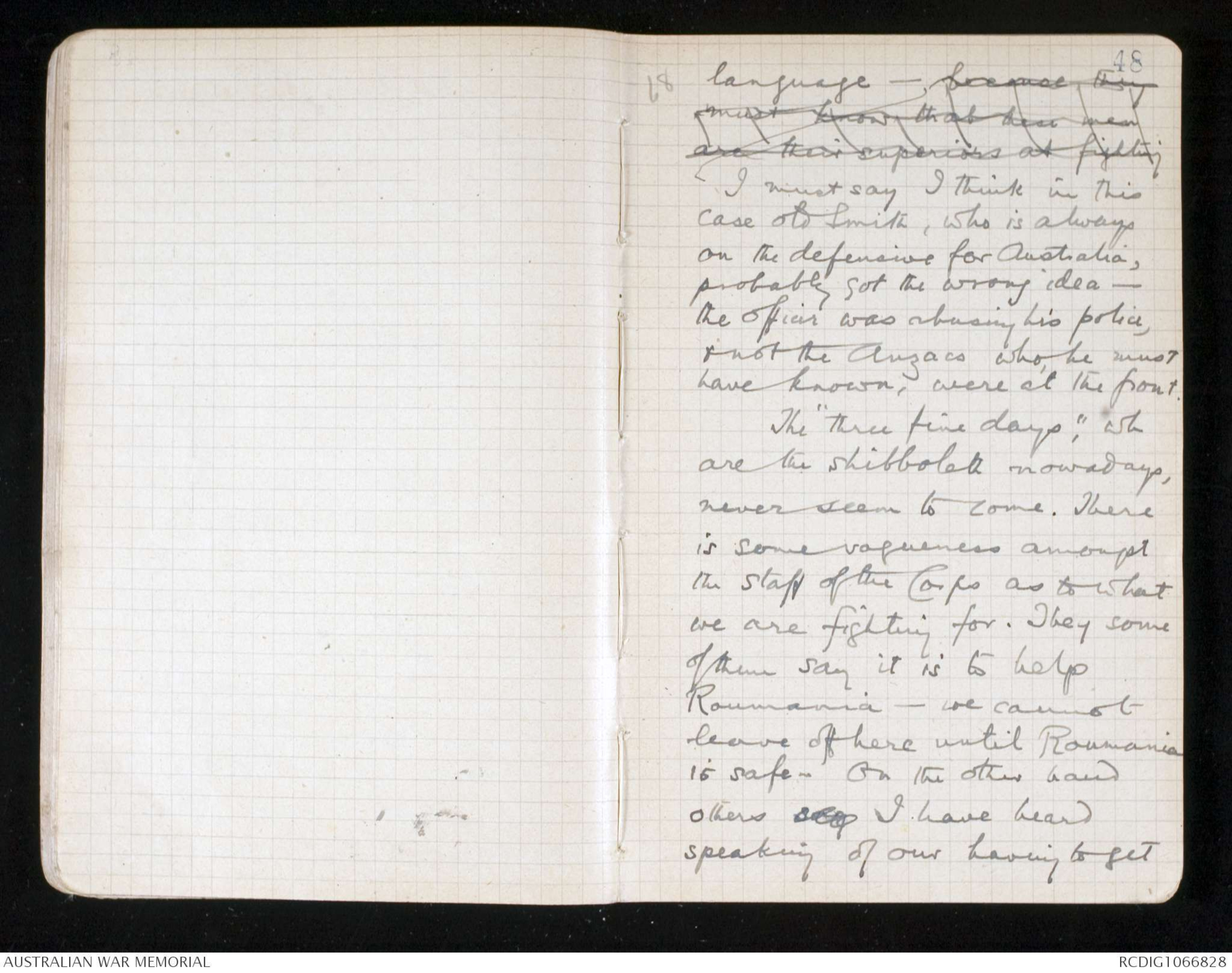
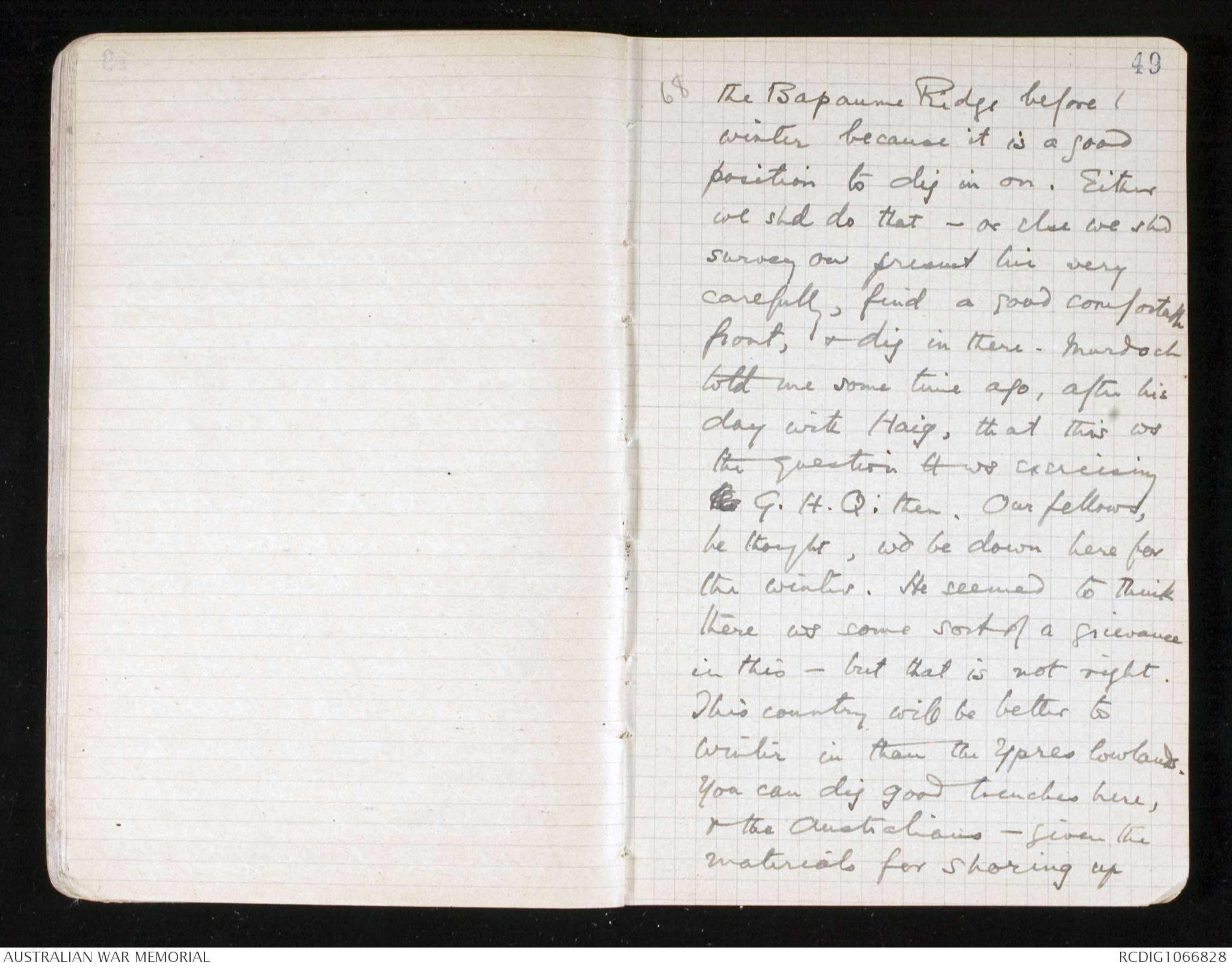
68 40
White had sketched for me.
“Well we rounded up
about a score of them &
locked them up all day
& paraded them in /
evening & old Williams
came along. They were
a perfectly quiet & respectable
lot - & they had had nothing
to eat or drink, poor chaps -t Old Williams had dined
by that time - dined jolly
well - I shall so he addressed interviewed the men there
in the courtyard & made
a speech to them. He I
shall never forget the scene.
The only light we had was
a flickering candle wh
was held by my sergeant
68 41
& in the light of it old
Williams stood up there in
front of them. He told them
what magnificent work they
had done; what hardships
they had gone thro'; & he
ended up by promising them
tt he wd see tt no charge
wd be laid agst them by
wh any harm cd happen
to them. Then he drove them
all away in a big lor
motor lorry.
"That ws / evening
when he ws going to handcuff
them in pairs & flog them
out o / town," sd the
A.P.M.
"I never had any
trouble w them at all,
68 42
except once," sd the
A.P.M. "That ws when
we had 18 of them locked
up down there in the
guard room, & the
guard came running up
to me to say tt they
were setting fire to a
house. I went down &
found tt they had taken
the straw out of some
mattresses wh were
in / guard room, & piled
it up agst / door, &
set fire to it to burn
the door down."
I asked them what they
had done it for.
"We couldn't get anything
68 43
to eat," they only said; "only
bully beef & biscuits."
"Well what do you
expect to get?" I asked
them. "This is a guard
room, you're in - not
a grand hotel. What did
you think you were going
to get - Pèche Melba
& cream, or what?"
"They laughed & I never
had the least trouble
with them afterwds."
"No - you wouldn't,"
said old Smith. And by
the tone of his voice I knew
that this A.P.M. hadjus established himself
as Smith's firm friend - for
the rest of his days, probably.
68 44
"We'll do anything we
can to help, you, son," sd
Smith on leaving.
"He could manage
Australians alright," sd
Smith to me as we left -
"But what do you think of
that - eh? Isn't that the
limit?"
There are British officers
who certainly do not knowhow to deal with Australians
in that spirit. As Bazley -
who is a clean boy if there
ever lived one - ws leaving
the motor garage at Villers
Bocage, an English A.S.C.
officer came up to him in
a rage. "What do your
fellows mean by making
68 45
a latrine of this woman's
garden?" he sd. "I know
it ws the Anzacs - the dirty
Anzacs."
"I beg your pardon, Sir,
but there are plenty of other
troops here," sd the boy.
"Oh, I know it ws the
Anzacs," the chap went on,
in a white heat of temper." I
say 20 anzac horsemen
passing here last night & I
am certain it ws the Anzacs."
& went on in this sort of strain.
There had bn some Anzac
light horse camped about there
in the night; & very likely
they did - one of them - make
some mess in the garden.
It was hopeless to find
68 46
latrines in Villers Bocage
- & the chances are tt, as
with the billets, if you did
find them the British troops
had left them so filthy tt no
decently clean person wd go
near them. But with it all
in he had no right whatever
to speak to Bazley in tt way.
I went along in / hope of
finding him still there, to tell
him so; but he ws not there.
Some of these men are
undoubtedly jealous of us.
Another ^mounted officer, Smith told us,
today tried to force his way
past one of the Australian
police who ws controlling
traffic on / roads near /
front. The man, in accordance
68 47
w instructions, had stopped him
from going in / opposite directn
to / traffic. This ws very irritating,
no doubt, but it ws / strict rule,
without wh the getting of supplies
up to / front wd be impossible; ^& tt is ^a
/ thing most urgently required
just now.
The officer (I think he ws a
Major) turned on the traffic man:
"You damned Anzacs," he sd.
"I know you. They've sent you
"back here because you're no
"bloody good up at the front" -
(it sounds to me as tho' it ws
the police, he ws speaking of - not
the whole corps.)
Anyway some of these ill-bred
officers - & there always are some even
amongst the best - show their
jealousy of us in very foolish
68 48
language - because theymust know that these menare their superiors at fighting
I must say I think in this
case old Smith, who is always
on the defensive for Australia,
probably got the wrong idea -
the officer was abusing his police,
& not the Anzacs who, he must
have known, were at the front.
The "three fine days," wh
are the shibboleth nowadays,
never seem to come. There
is some vagueness amongst
the staff of the Corps as to what
we are fighting for. They some
of them say it is to help
Roumania - we cannot
leave off here until Roumania
is safe - On the other hand
others say I have heard
speaking of our having to get
68 49
the Bapaume Ridge before /
winter because it is a good
position to dig in on. Either
we shd do that - or else we shd
survey our present line very
carefully, find a good comfortable
front, & dig in there. Murdoch
told me some time ago, after his
day with Haig, that this ws
the question tt ws exercisingthe G.H.Q. then. Our fellows,
he thought, wd be down here for
the winter, He seemed to think
there ws some sort of a grievance
in this - but that is not right.
This country will be better to
winter in than the Ypres lowlands.
You can dig good trenches here,
& the Australians - given the
materials for shoring up
 Deb Parkinson
Deb ParkinsonThis transcription item is now locked to you for editing. To release the lock either Save your changes or Cancel.
This lock will be automatically released after 60 minutes of inactivity.